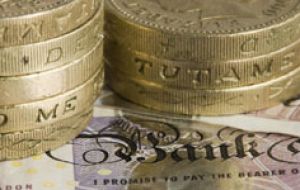MercoPress. South Atlantic News Agency
Bank of England leaves rates on hold at record low 0.5%
 Fears the UK economy recovery is still very fragile
Fears the UK economy recovery is still very fragile The Bank of England's Monetary Policy Committee (MPC) has kept UK interest rates on hold at a record low of 0.5%. Economists had expected no move in rates because the latest data has shown the UK economic recovery remains weak.
The committee's decision comes despite the annual rate of inflation remaining at 4.5% in May, well above the Bank's 2% target. The Bank also kept its program of quantitative easing unchanged at £200bn.
The MPC is split over which is the greater problem, the weak economy, which recent data suggests has slowed from the 0.5% growth of the first quarter, or inflation, which is squeezing consumers' purchasing power.
The National Institute for Economic and Social Research's latest forecast suggests the UK economy barely grew in the second quarter of year. It predicts growth of 0.1%, below other recent estimates which predict a rise of 0.3%.
The first official estimate for second quarter gross domestic product (GDP) will come on 26 July.
Some members of the committee would like interest rates to rise, to head off the risk of inflation accelerating. Savers would also like to see rates go up. One lobby group, Save our Savers, says that the value of UK savings has been eroded by £50bn in the past year because of inflation and low interest rates.
Other MPC members believe that government cutbacks and tax rises will lead to lower inflation by further curbing consumers' spending power, and that energy prices, a large part of the inflation problem, will naturally start to fall back.
Earlier on Thursday, official figures on UK manufacturing showed output had jumped by 1.8% in May, although this followed a 1.6% drop the previous month when output was disrupted by public holidays around the royal wedding and Easter.
There is also the prospect of higher energy prices. Scottish Power has said it will increase gas prices by 19% and electricity bills by 10%, and its rivals are expected to announce similar rises.
The chief economist of the British Chambers of Commerce, David Kern, backed the decision not to change rates. “Tightening policy in reaction to higher utility prices and internationally generated inflation would be a major mistake,” he said.
“Premature rate increases, at a time when the government is tightening fiscal policy through its deficit-cutting programme, could damage jobs and growth and should be avoided.”
Lee Hopley, chief economist at the EEF manufacturers' organisation, said: ”The decision for no change was a sure fire bet. Inflation may still be uncomfortably high, but the outlook hasn't materially shifted. On the growth front however, there are now some emerging signs of weakness at home and abroad”.(BBC).-




Top Comments
Disclaimer & comment rulesCommenting for this story is now closed.
If you have a Facebook account, become a fan and comment on our Facebook Page!